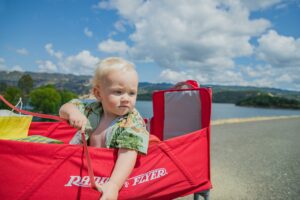
Traveling with toddlers can be a delightful yet challenging experience for parents and guardians. Between packing, maintaining routines, and keeping little ones entertained, the task can feel daunting. However, one of the best ways to ease the journey is to incorporate play-based learning. This approach keeps toddlers engaged and entertained while promoting essential developmental skills. Here’s how to make your travels educational and fun with your small children.
Understanding Play-Based Learning
Before diving into the strategies, it’s crucial to understand the concept of play-based learning. This educational approach allows children to explore and learn at their own pace through play. Whether it’s a structured game or open-ended exploration, play encourages creativity, problem-solving, and social skills. By integrating this method into your travels, you can make your trips memorable and educational.
Pre-Trip Preparation: Setting the Stage for Learning
 1. Travel-Themed Books: Introduce your toddler to travel concepts with books like “Oh, The Places You’ll Go!” by Dr. Seuss or “Where Is the Eiffel Tower?” by Megan E. Bryant. Reading about destinations before traveling makes the journey more exciting and educational.
1. Travel-Themed Books: Introduce your toddler to travel concepts with books like “Oh, The Places You’ll Go!” by Dr. Seuss or “Where Is the Eiffel Tower?” by Megan E. Bryant. Reading about destinations before traveling makes the journey more exciting and educational.
2. Destination-Based Play: Create destination-themed play opportunities at home. If you’re heading to the beach, set up a sandbox or a small water table and teach your child about seashells and marine life. For mountain trips, explore rocks and leaves in your backyard.
3. Packing Involvement: Let your child participate in packing their own small backpack. Include favorite toys, books, and travel games. This gives them a sense of responsibility and allows them to take part in the travel preparation process.
In-Transit Activities: Turning Commutes into Classrooms
- Interactive Maps and Travel Journals: Give your toddler a simple travel journal with stickers and a map. Mark your route on the map and allow them to decorate their journal with drawings and stickers as you progress. This activity fosters spatial awareness and storytelling skills.
- Audiobooks and Music: Load up your device with audiobooks and songs that match your destination’s culture or theme. For example, listen to flamenco music if you’re heading to Spain or folk tales from local cultures. Music and storytelling help with language development and cultural understanding.
- Travel-Themed Games: Classic games like “I Spy” or “License Plate Bingo” can keep your toddler engaged while promoting observation and attention skills. For airplane travel, look for airport scavenger hunts that challenge your child to find specific objects.
At the Destination: Play-Based Learning in Action

- Scavenger Hunts: Organize scavenger hunts based on the destination. If you’re visiting a city, look for iconic landmarks or local symbols. For nature destinations, collect leaves, rocks, or seashells. Scavenger hunts encourage observation, problem-solving, and categorization skills.
- Museum and Zoo Visits: Many museums and zoos have interactive exhibits designed for children. Engage your toddler by asking questions about the exhibits, letting them touch or play with interactive displays, and encouraging them to share their thoughts.
- Local Market Exploration: Visit local markets to introduce your toddler to different fruits, vegetables, and foods. Let them pick out something new to try. This sensory experience can expand their taste buds and help them understand cultural diversity.
- Nature Walks and Parks: Take nature walks to explore the local flora and fauna. Play games like “Nature Bingo” or create leaf rubbings using crayons and paper. Local parks often have playgrounds where toddlers can burn off energy while interacting with other children.
Tips for Seamless Play-Based Learning on the Go
- Travel Kit Essentials: Pack a travel kit with play-based learning essentials like coloring books, crayons, stickers, and small educational toys. A small whiteboard and markers can be used for drawing, writing, and playing games.
- Flexible Schedule: While it’s essential to have a travel itinerary, keep it flexible to accommodate your toddler’s needs. Allow extra time for exploration, play, and relaxation to prevent tantrums and fatigue.
- Routine Incorporation: Stick to your toddler’s daily routines as much as possible. Maintain familiar nap and meal times to help them feel secure and reduce travel-related stress.
- Positive Reinforcement: Praise your toddler for participating in learning activities, listening during tours, or trying new foods. Positive reinforcement encourages them to continue exploring and learning.
Traveling with toddlers can be smooth and enjoyable when play-based learning is incorporated into the journey. By preparing ahead of time, using transit as an educational opportunity, and engaging in destination-based play, parents and guardians can create memorable travel experiences that foster growth and development.
Remember, travel is a journey for the entire family. Embrace the challenges and savor the moments of joy and discovery. With the right mindset and activities, you and your toddler can explore the world together, one playful adventure at a time.

